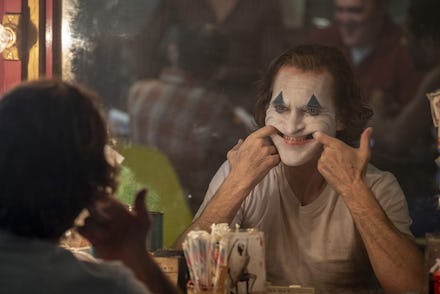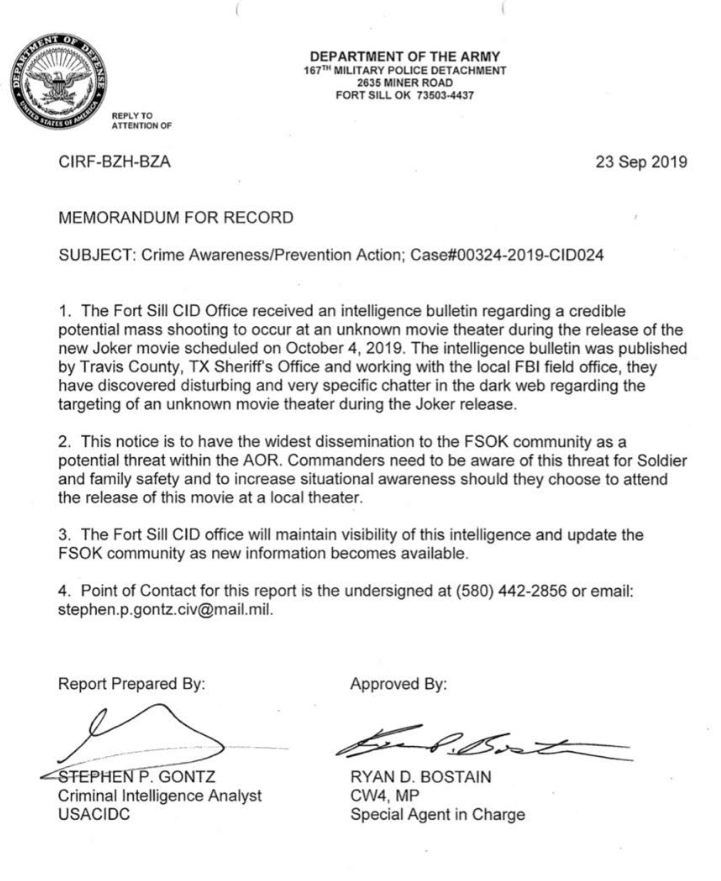Concerns over 'Joker' screenings are missing a bigger point about gun violence

The new Joker film starring Joaquin Phoenix is at the center of even more controversy this week, after the military sent an email to service members warning them “incel” extremists could target screenings of the film.
It acknowledged “there are no known specific credible threats” but encouraged soldiers to be vigilant. “When entering theaters, identify two escape routes, remain aware of your surroundings, and remember the phrase ‘run, hide, fight,’” it read.
On Monday, however, senior officials in the Army issued a separate memo announcing it had “credible” information from Texas law enforcement and the FBI about “disturbing and very specific chatter” on the dark web about a targeted attack. “Commanders need to be aware of this threat to soldier and family safety [...] should they choose to attend the release of this movie at a local theater,” the memo read.
An FBI spokesperson told Gizmodo, “While our standard practice is to not comment on specific intelligence products, the FBI is in touch with our law enforcement and private sector partners about the online posts. As always, we encourage the public to remain vigilant and to promptly report suspicious activity to law enforcement.”

Concerns that the Joker origin story could inspire loners to perpetrate violent attacks has infused real-life horror into the premiere of a movie about a fictional comic book villain. Earlier this week, family members of the victims of a 2012 movie theater shooting in Aurora, Colorado, sent a letter to Warner Bros. objecting to the message of Joker and urging the studio to lobby for gun reform. The cinema where the attack took place during Batman flick The Dark Knight Rises won’t be screening Joker, a manager told The Washington Post.
It’s not clear whether all the worry is warranted. A lot of folks seem to be taking a “better safe than sorry” stance, while others have pointed out the flawed logic behind a public freakout over Joker but not other movies, whether or not they’re violent. Three years after the Dark Knight shooting, a gunman attacked a screening of Amy Schumer’s movie Trainwreck in Lafayette, Louisiana, killing two people. The sad fact in America is that seeing any film in theaters is inherently kind of risky.
The military, helpfully, defined incels for soldiers as “individuals who express frustration from perceived disadvantages to starting intimate relationships.” Incels themselves tend to self-describe as lonely, horny, ugly dudes whose romantic prospects are thwarted by the “Chads” (or alpha males) of the world.
The incel community is very aware of the threats towards Joker and the military’s response, but the jury seems to be out on whether or not they’re credible. On an incels.co thread called “[Serious] How many theaters do you think will get shot when the Joker movie is released?” the responses range from dismissive to enthusiastic. “Not enough Chads and Stacys that's for sure,” one post read.
On the subreddit r/Braincels, another said, “Nothing is going to happen. Only the usual clump of SJWs [social justice warriors] is whining about it, because the movie defeats their preconceived, unnuanced [sic] notion that all lonely men are evil losers with no capacity to change.” Many of them seemed genuinely excited for Joker and added they'd already bought tickets, which makes an incel-orchestrated attack seem even less likely.
Mostly, incels seem mad the government is branding them terrorists. “When the fbi kicks down my door and finds my ugly Indian ass I will ask them politely to buy me a new door,” one Redditor wrote.
The controversy around Joker has riled the filmmakers, probably because fearful audiences staying home would cripple ticket sales and hit their bottom line. After receiving the letter from the Aurora families, Warner Bros. broke its silence on criticism that the film glamorized a mass murderer. “Make no mistake: neither the fictional character Joker, nor the film, is an endorsement of real-world violence of any kind,” the statement read. “It is not the intention of the film, the filmmakers or the studio to hold this character up as a hero.”
The film’s star, Joaquin Phoenix, walked out of an interview with The Telegraph when a reporter asked if he worried Joker might “perversely” end up inspiring the exact sort of person it’s about: “an unstable, self-pitying loner with a mass-shooter mindset.”
“Why? Why would you…? No… no,” the star mumbled before rushing out of the room. After an hour of peace negotiations with a press rep, Phoenix came back and explained he’d panicked because he’d never considered the possibility.
But just a few days beforehand, Phoenix and director Todd Phillips both defended the film against similar criticism to IGN. “To me, art can be complicated and oftentimes art is meant to be complicated. If you want uncomplicated art, you might want to take up calligraphy, but filmmaking will always be a complicated art,” Phillips said. “The movie makes statements about a lack of love, childhood trauma, lack of compassion in the world. I think people can handle that message.”
Some lonely, angry people may see themselves in Joker, but the same can be said for any number of twisted or violent narratives. “I don’t think it’s the responsibility of a filmmaker to teach the audience morality or the difference between right or wrong. I mean, to me, I think that that’s obvious. I think if you have somebody that has that level of emotional disturbance, they can find fuel anywhere. I just don’t think that you can function that way,” Phoenix said.
“I think it’s because outrage is a commodity, I think it’s something that has been a commodity for a while,” Phillips told TheWrap in a September 20 interview published yesterday. “What’s outstanding to me in this discourse in this movie is how easily the far left can sound like the far right when it suits their agenda. It’s really been eye-opening for me.”
All the debate over Joker misses the point, however. Americans don’t feel safe at the movies, Walmart, their place of worship, school, work, nightclubs, concerts, or bars anymore. If someone truly wishes to harm their fellow humans, there’s only so much we can do to prevent that. But it’d be nice if we didn’t make murder so easy in America that we’re afraid to see a movie on opening night.